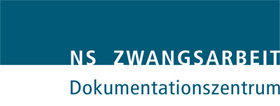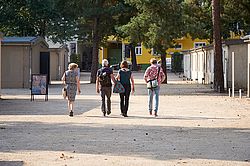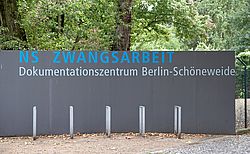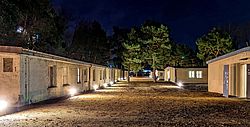About us
The Nazi Forced Labor Documentation Center in Berlin-Schöneweide is the only institution at the historical site of an almost completely preserved forced labor camp in the middle of a residential district. Since 2006, it has made visible the fate of the more than 26 million men, women and children who were exploited as forced labourers by the Nazi regime during the Second World War.
Under the eyes of the German civilian population, they worked in all areas of society - in large, medium-sized and small companies, in all branches - from carpentry, bakery, brewery to clothing shop, in municipal institutions such as garbage collection and agriculture, in church cemeteries, to private households. In the Berlin city area alone there were about 3,000 camps for forced laborers.
Documenting. Mediate. Preserve.
As an archive, exhibition, and learning site, the Documentation Center provides information on the history and dimensions of the largest group of Nazi forced laborers. Around 8.4 million people were deported to the German Reich as "civilian" forced laborers from the occupied territories of Europe. The former accommodation barracks serve as exhibition, event and educational venues.
In its archive and library, the Documentation Centre records the voices and historical heritage of the survivors for future generations and for further research on the subject. Recently, the international youth meeting place has made it possible to engage intensively with the subject across national borders.
Find out more: The historical site
Construction and use
The camp in Schöneweide was built at the end of 1943 by the "General Building Inspector for the Reich Capital" (GBI) under the direction of Albert Speer in the middle of a residential area. The 3.3-hectare area (corresponding to approx. 4.5 football pitches) comprised a total of 13 accommodation barracks as well as an economic barrack in the middle. The camp was planned for 2,160 forced laborers. However, the camp was never fully occupied. Over 400 Italian forced laborers, including military internees, as well as civilian forced laborers from various countries were accommodated here. In the final months of the war in 1945, two barracks also served as accommodation for female concentration camp prisoners who had to work at the battery factory Pertrix.
After the Liberation
After 1945, the Red Army first used some barracks as paper storage for the Soviet military administration. Shortly after the war, the GDR Vaccine Institute moved into the six barracks, which today belong to the Documentation Centre. The remaining barracks are still used today by a workshop, a sauna, a day-care centre for children, a car dealership and a cone restaurant. After 1989, the Institute for Vaccines was wound up; from 1995, this part of the historical camp site stood empty for more than ten years.
Origin of the Documentation Centre
In 2004, the Berlin Senate decided to set up a documentation centre on the history of Nazi forced labour here. With the support of the Foundation "Remembrance, Responsibility and Future", an International Advisory Board was established in 2005/2006. It discussed the design and use of the historical site as well as the conception of the future documentation centre as an exhibition, archive and learning location. Two barracks were prepared for exhibitions, events, seminars, archive, library and offices. On 24 August 2006, the Documentation Centre was opened and officially handed over to the Topography of Terror Foundation. In the meantime, another three barracks have been renovated, one of which has served as an international youth meeting place since 2015.
The Documentation Centre would not have been possible without the strong civic commitment and the growing public discussion about the compensation of former forced labourers.
The Team
Head:
Dr. Christine Glauning, management
Tel: +49 30 6390 288 0
Dr. Roland Borchers, deputy management
Tel: +49 30 6390 288 15
Secretariat:
Eva-Maria Beiner
Tel: +49 30 6390 288 10
Press:
N.N.
Tel: +49 30 6390 288 14
Scientific Fellows:
Iris Hax
Tel: +49 30 6390 288 13
Felix Beyer-Buns, scientific referee
Tel: +49 30 6390 288 02
Simon Stöckle, scientific trainee
Tel: +49 30 6390 288 28
Education department:
Daniela Geppert, head
Tel: +49 30 6390 288 11
Eva Kuby, Advice and coordination
Tel: +49 30 6390 288 27
Christian Weber, Outreach
Tel: +49 30 6390 288 01
Tanja Vaitulevich, International Youth Meeting Centre
Tel: +49 30 6390 288 0
Isabell Jablonski, student assistant Int. Youth Meeting Centre
Tel: +49 30 6390 288 04
Lucie Meier, student assistant
Tel: +49 30 6390 288 26
Collection:
Mia Golfels
Tel: +49 30 6390 288 22
Antonia Krohn, student assistant
Tel: +49 30 6390 288 19
Library:
Josefine Brüning, student assistant
Luise Gottschalk, student assistant
Tel: +49 30 6390 288 23
Administration:
Manuela Liek
Tel: +49 30 6390 288 0
Michaela Wandtke
Tel: +49 30 6390 288 24



